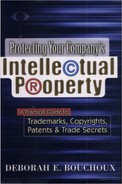Infringement Actions
Once it is determined that another mark may be confusingly similar, a trademark owner should take aggressive action. Failure to take steps to protect a mark can be held to constitute a waiver of any rights in the mark. If a mark is federally registered, the U.S. Trademark Act allows the registrant to initiate a civil action in federal court against any party who used the mark without the registrant's consent in a manner likely to cause confusion. Prospective plaintiffs generally send a notice or letter called a cease and desist letter to the party who uses the allegedly infringing mark. The letter usually describes the first party's mark, states that the second party's mark is junior in time to the first mark, and demands that the alleged infringer cease and desist any further use of its competing mark. The prospective plaintiff needs to conduct some investigation before sending such a letter; if the recipient of the letter has seniority over the sender, the sender is now in the unfortunate position of having stated in writing the belief that the two marks are confusingly similar and may have difficulty defending against an infringement action brought by the other. See Figure 6-1 for a sample cease and desist letter.
If the cease and desist letter is ignored or the parties cannot resolve their differences, the plaintiff may bring an action for trademark infringement in federal court. The action is initiated by the filing of a complaint that sets forth a short and plain statement of the plaintiff's allegations. The defendant normally files an answer to the complaint and usually denies the plaintiff's allegations and asserts several defenses. The defendant may assert that the mark was abandoned, that it was procured through fraud, that it is functional, that it has become generic, that the plaintiff has acquiesced in the defendant's use of the mark and has waived its rights such that it is now barred from asserting infringement, or that the plaintiff has so unreasonably delayed in enforcing his or her rights that the defendant is prejudiced thereby in that it has expended significant sums in advertising and promoting the mark (a defense called laches). Another defense that is often asserted is that the defendant's use of the plaintiff's mark is a fair use. For example, assume ABC Paper Co. has a registration for BLUE DENIM® for its stationery product. If a competitor merely describes the color of its paper as blue denim, such is probably a fair use. The term blue denim is used merely to describe the color of a product and is not used in a trademark sense. Finally, defendants usually assert that the marks are not confusingly similar and introduce evidence of other similar marks to show that numerous other similar marks are coexisting.
November 30, 2000 Mr.James K. Kenney Intellisystems, Inc. 506 Park Avenue New York, New York 10090 Re: Trademark STRATEGICON U.S. Registration No. 1,980,778 Dear Mr. Kenney: Strategic E-Systems, Inc. (''SES''), is the owner of U.S. Trademark Registration No. 1,980,778, registered on December 16, 1998 for the mark STRATEGICON, used in connection with computer programs for accounting and financial purposes. SES has used the STRATEGICON mark since at least February 1994 and has expended a great deal of time and money in establishing goodwill in its mark, which is known to consumers both nationally and internationally. It has come to our attention that Intellisystems, Inc., has recently begun using the mark STRATEGIC-ON in connection with computer programs for maintaining accounting records. Your use of STRATEGIC-ON in connection with such goods is likely to cause confusion, deception, and mistake in the marketplace in that consumers, upon encountering your mark, may believe that the goods offered under the mark are associated with or emanate from SES. SES therefore hereby demands that Intellisystems, Inc., immediately cease and desist from any further use of the mark STRATEGIC-ON or any confusingly similar mark in connection with any goods or services and cease and desist from offering, marketing, or selling any goods or services under such mark. If SES does not receive your response within ten days of the date of this letter confirming that Intellisystems, Inc., has ceased all use of STRATEGIC-ON or any confusingly similar mark, SES will initiate an action in federal court for trademark infringement and will pursue all appropriate legal remedies, including injunctive relief, damages, and attorney's fees and costs incurred in protecting its valuable mark. We look forward to hearing from you. Sincerely, _____________________ Strategic E-Systems, Inc. |
Discovery will commence and the parties will take depositions of each other's employees, officers, and others to determine how and when the marks were created, how they are used, quantities of sales under the marks, and any other relevant evidence that would tend to show or disprove that the marks are likely to be confused. Documents can be re quested, and interrogatories (sets of written questions) will be propounded by each party. If the parties cannot resolve the matter amicably, it proceeds to trial. A jury may be requested by either party but is not required.
